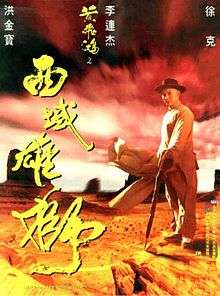Once Upon a Time in China and America
| Once Upon a Time in China and America | |
|---|---|
 Hong Kong film poster | |
| Traditional | 黃飛鴻之西域雄獅 |
| Simplified | 黄飞鸿之西域雄狮 |
| Mandarin | Huáng Fēihǒng Zhī Xīyù Xíongshī |
| Cantonese | Wong4 Fei1-hung4 Zi1 Sai1-waak6 Hung4-si1 |
| Directed by |
Sammo Hung Lau Kar-wing |
| Produced by | Tsui Hark |
| Written by |
Sze-to Cheuk-hon Shut Mei-yee Sharon Hui Philip Kwok So Man-sing |
| Starring |
Jet Li Rosamund Kwan Hung Yan-yan Jeff Wolfe Power Chan |
| Music by | Lowell Lo |
| Cinematography |
Walter Gregg Lam Fai-tai Koo Kwok-wah |
| Edited by |
Marco Mak Angie Lam |
Production company | |
| Distributed by | China Star Entertainment Group |
Release dates |
|
Running time | 98 minutes |
| Country | Hong Kong |
| Language |
Cantonese English |
| Box office | HK$30,268,415.00[1] |
Once Upon a Time in China and America, also known as Once Upon a Time in China VI, is a 1997 Hong Kong martial arts film directed by Lau Kar-wing and Sammo Hung in his last directorial effort until the The Bodyguard, who also worked on the film's fight choreography. The film is the sixth and final installment in the Once Upon a Time in China film series. It also saw the return of Jet Li as Chinese folk hero Wong Fei-hung, who was replaced by Vincent Zhao in the fourth and fifth films. The film was released in the Hong Kong on 1 February 1997.
Plot
Wong Fei-hung, Clubfoot and "13th Aunt" cross the Pacific Ocean to America to visit Bucktooth So, who has opened a Po-chi-lam clinic there. While traveling by carriage through the wilderness, they pick up a friendly cowboy named Billy, who is almost dying of thirst. When the party stops to have lunch, a bunch of hostile Native Americans ambush them. Wong, Clubfoot and 13th Aunt escape unharmed but their carriage slides off a cliff and falls into a river. 13th Aunt and Clubfoot are rescued and taken to Bucktooth So's clinic. However, Wong hits his head on a rock and loses his memory as a consequence. He is saved by a Native American tribe.
Back in town, the mayor makes oppressive rules with the intention of causing trouble for the Chinese people living there, while Billy tries to stop him. Meanwhile, the tribe that rescues Wong encounters a more powerful rival tribe. The rival leader, a fearsome warrior, injures Fierce Eagle (the chief's son) on Wong's side. However, to everyone's surprise, Wong defeats the rival leader and half of his men with his kung-fu, causing the rival tribe to flee in fear. Wong is eventually brought back to the town where his companions attempt to help him recall his past.
When Wong finally regains his memory, he forgets everything that has happened during the period when he suffered from amnesia. In the meantime, the mayor is in debt and decides to hire a Mexican bandit to help him rob the bank, so that he can abscond the town with a ton of cash. The robbery is successful and the mayor frames the people in Po-chi-lam for it. Wong and the others are arrested and almost hanged. Just then, the Mexican bandit discovers that the mayor has paid him US$400,000 less, so he returns to town to claim his money. In the ensuing fight, the mayor is killed and Wong manages to capture the bandit to clear his name. At the end of the film, Billy is elected as the new mayor while Wong, 13th Aunt and Clubfoot return to China.
Cast
- Jet Li as Wong Fei-hung
- Rosamund Kwan as "13th Aunt" Siu-kwan
- Hung Yan-yan as Clubfoot
- Power Chan as "Bucktooth" So
- Jeff Wolfe as Billy
- Joe Sayah as Mexican bandit
- Richard Ng as Uncle Han
- Lau Kar-wing as Lion Dance Drummer
- T.J. Storm as Rival Tribe Indian Brave
- Mars (extra) (uncredited)
- Patrick Lung as Uncle Lung
- Ron Ring
- Ryon Marshall
- Freddy Joe
- Chrysta Bell as Sarah
- William Fung as Immigrant worker
- Johnny Koo as Immigrant worker
- Alan Chanas
- Wong Choh-wa
- Fan Chin-hung
- Choi Kwok-keung
- Jason De Hoyos as Fierce Eagle
- Daniel Lujan as Flying Eagle
Production
The film was shot at the Alamo Village, the film set originally created for John Wayne's The Alamo.[2]
Awards and nominations
| Awards and nominations | |||
|---|---|---|---|
| Ceremony | Category | Recipient | Outcome |
| 17th Hong Kong Film Awards | Best Action Choreography | Sammo Hung | Nominated |
Box office
Jet Li's return to the series - and, in all likelihood, the final installment of the franchise - opened on the weekend of Chinese New Year, and faced stiff competition from director Hung's own film, Mr. Nice Guy. Still, it grossed an excellent HK$30,268,415 at the Hong Kong box office.[1]
Mandarin version
A sync-sound Mandarin soundtrack features a number of the Chinese actors speaking their own language (including Jet Li, Patrick Lung - Richard Ng speaks Cantonese however), whilst others are dubbed.
References
- 1 2 HKMDB
- ↑ Blumenthal, Ralph (26 March 2004). "The Alamo of the Big Screen Tries to Skirt the Fate of the Original". The New York Times. Retrieved 31 March 2014.
External links
- Once Upon a Time in China and America at the Internet Movie Database
- Once Upon a Time in China and America at AllMovie
- HKMDB
- HK Cinemagic